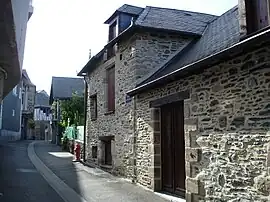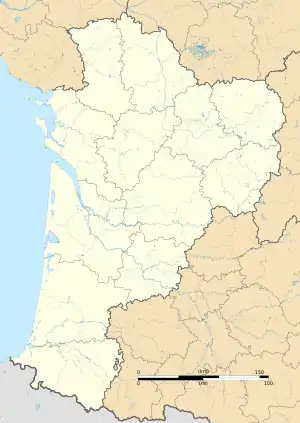Donzenac
Donzenac (French pronunciation: [dɔ̃znak]) is a commune in the Corrèze department in central France.
Donzenac | |
|---|---|
 A mediaeval street in Donzenac | |
.svg.png.webp) Coat of arms | |
Location of Donzenac | |
 Donzenac  Donzenac | |
| Coordinates: 45°13′41″N 1°31′30″E | |
| Country | France |
| Region | Nouvelle-Aquitaine |
| Department | Corrèze |
| Arrondissement | Brive-la-Gaillarde |
| Canton | Allassac |
| Intercommunality | CA Bassin de Brive |
| Government | |
| • Mayor (2020–2026) | Yves Laporte[1] |
| Area 1 | 24.12 km2 (9.31 sq mi) |
| Population | 2,691 |
| • Density | 110/km2 (290/sq mi) |
| Time zone | UTC+01:00 (CET) |
| • Summer (DST) | UTC+02:00 (CEST) |
| INSEE/Postal code | 19072 /19270 |
| Elevation | 112–388 m (367–1,273 ft) (avg. 204 m or 669 ft) |
| 1 French Land Register data, which excludes lakes, ponds, glaciers > 1 km2 (0.386 sq mi or 247 acres) and river estuaries. | |
Geography
Commune of the urban area of Brive-la-Gaillarde located in the Massif Central on the national road N20, 10 km north of Brive-la-Gaillarde.
Perched on an outcrop dominating the Maumont, resulting from the confluence of the Maumont Blanc and the Maumont Noir. Another tributary of the Maumont, the Clan stream waters the western part of the communal territory.
The Château district, Donzenac, a former fortified village, still retains its medieval appearance with its high walls, narrow, winding lanes that all return to the Church district.
The village of Travassac, located 3 km above the town, is one of the most important hamlets of the commune. It is a typical village once inhabited by slate workers who worked in the quarry.
This hamlet is home to a vertically operated former open slate quarry. This unique site in Europe is now open to the public.
Population
| Year | Pop. | ±% p.a. |
|---|---|---|
| 1968 | 1,884 | — |
| 1975 | 1,795 | −0.69% |
| 1982 | 1,908 | +0.88% |
| 1990 | 2,050 | +0.90% |
| 1999 | 2,147 | +0.52% |
| 2007 | 2,387 | +1.33% |
| 2012 | 2,584 | +1.60% |
| 2017 | 2,651 | +0.51% |
| Source: INSEE[3] | ||
See also
References
- "Répertoire national des élus: les maires". data.gouv.fr, Plateforme ouverte des données publiques françaises (in French). 2 December 2020.
- "Populations légales 2020". The National Institute of Statistics and Economic Studies. 29 December 2022.
- Population en historique depuis 1968, INSEE